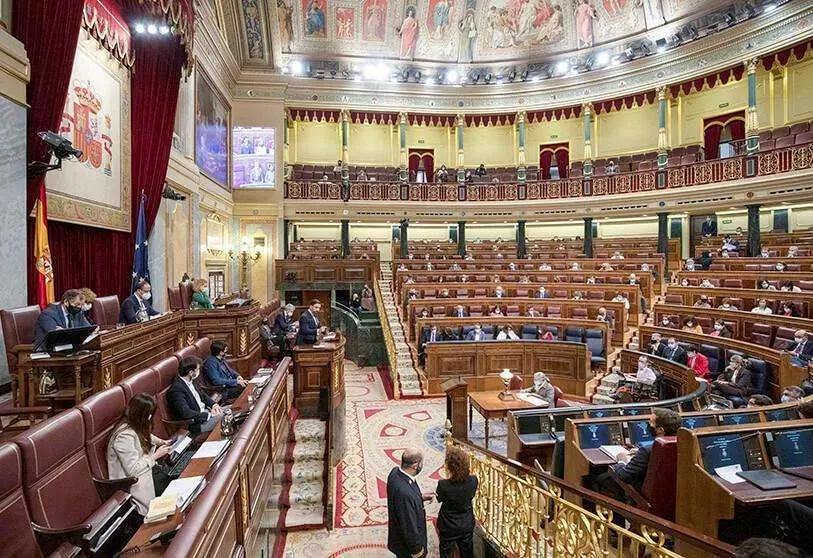Victims of terrorism warn of consequences of motion in Congress to give pensions and nationality to Polisario Front leaders

Majority associations of victims of terrorism in Spain and the Canary Islands Association of Victims of Terrorism (Acavite), in a joint meeting held in Madrid, urgently ask the majority parliamentary groups in the Congress of Deputies, such as PSOE, PP, Vox, PNV, Ciudadanos, PNV, Mixed Group of Coalición Canaria, Más País, and the rest of the parliamentary arc, to immediately stop the intention of Unidas Podemos, EH Bildu and Nueva Canarias to vote in favour of a parliamentary motion in its initial phase to grant the leaders of the Polisario Front and Saharawi descendants - as is the case of the bloodthirsty president Brahim Ghali - lifetime pensions at the expense of the Spanish budget and public treasury. As well as Spanish nationality, which would benefit the thousands of people supposedly born before Spain left the Sahara and all their descendants.
Numerous associations of victims of terrorism from different communities in Spain, including the Asociación Canaria de Víctimas del Terrorismo, chaired by Lucía Jiménez, are urgently calling for this parliamentary initiative not to be approved due to the seriousness of the irreversible consequences of all kinds that it would entail, in addition to the humiliation and contempt for the island victims of terrorism, which are classified as crimes under current legislation. In this sense, they demand that the majority parliamentary groups in the Congress of Deputies, the Senate, and the ministries involved such as the Ministry of the Interior led by Grande-Marlaska, the Treasury, Economy and Social Security, led by Escrivá, Montero and Calviño respectively, to stop and support the refusal of the socialist group in the Lower House, in the face of the absurd and humiliating attempt to grant counterproductive benefits to leaders and members of the Sahrawi Polisario Front, who to date have neither paid nor collaborated with the Spanish justice system to clarify the brutal terrorist attacks against Spanish nationals, mostly from the Canary Islands, Andalusia, Galicia and the Basque Country. It is not in vain that many of these Saharawis, who at the same time have been Polisario leaders for 50 years, have filed a complaint with the Audiencia Nacional for the almost 300 terrorist attacks carried out against Spanish civilian workers, mostly from the Canary Islands, who worked in the mining company Foss-Bucraá and national fishermen, who were murdered, wounded, machine-gunned, kidnapped, tortured or disappeared (the latter being classified as crimes of genocide and crimes against humanity, which never expire); acts perpetrated by the Polisario Front and Mpaiac, from 1974 to 1987. It is an inexplicable circumstance that many of the widows and orphans from the Canary Islands of these attacks perpetrated by the Polisario Front have still not been granted extraordinary pensions for victims of terrorism, in addition to the legitimate compensation, by the Spanish government.
On the other hand, at a meeting held in Madrid and convened by the Commission of the Foundation for Victims of Terrorism (FVT), more than twenty associations from all over Spain addressed, among other issues, the urgent need to include a Bill in the Congress of Deputies - before the end of this legislature - to amend the obsolete Law 29/11. All the groups expressed the need for the Lower House to legislate quickly and increase the legitimate compensation for the more than 600 cases of unclarified and unsentenced terrorist attacks by different terrorist groups and gangs such as ETA, Polisario Front, Mpaiac, Terra Llure, Grapo, jihadist organisations, among others.
In addition, these groups urgently demanded, as was the case of the president of the Andalusian Association of Victims of Terrorism (AAVT), Joaquín Vidal, the legitimate and necessary equalisation of extraordinary pensions for victims with passive classes and Social Security for civilians and in favour of relatives of all victims who have suffered attacks, reservation of public employment quotas for relatives of victims up to grandchildren of direct victims, psycho-social-medical/pharmacological/psychological measures, a reserve quota of free coverage in homes for the elderly, clinics and hospitals, reparation measures in terms of housing, free services and qualifications in education at all levels, and an increase in assistance coverage in view of the increase and difficulties detected in recent times due to the high cost of living, aggravated by the pandemic that many victims and their families are still suffering today. A draft "Framework of Reference for Victims of Terrorism" was also presented to the different groups, which will be analysed and scrutinised by the different associations throughout Spain, as well as other issues of interest. It was also expressed the need to ask the successive governments and regional presidents of Catalonia, José Vargas, the Canary Islands, Lucía Jiménez, and Aragón and the Canary Islands, Ángel Víctor Torres, not to deliberately delay the respective complementary regional laws requested, which transfer competences for the correct compliance, given that these are the only two of the 17 autonomous communities of the State that do not want to approve these regulations for assistance to all victims of terrorism and their families.
- Andalusian Association of Victims of Terrorism, AAVT. Joaquín Vidal.
- Canarian Association of Victims of Terrorism, ACAVITE. Lucía Jiménez. President.
- Catalan Association of Victims of Terrorist Organisations, ACVOT, José Vargas. President.
- Murcian Association of Victims of Terrorism, AMUVITE. Luis Beñago. President.








